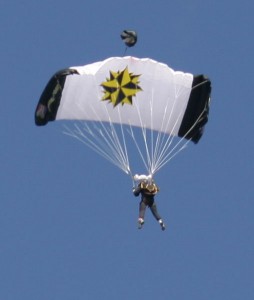2013-07-29 by Guy Martin
The Special Forces are a potentially useful asset that can be used by the SADC Standby Force as a force multiplier, according to South African Army Colonel Renier Coetzee.
Coetzee, speaking on behalf of Brigadier General Rudzani Maphwanya, head of the South African Special Forces, at the Land Forces Africa conference in Pretoria last week, said that special forces elements were not part of the pledges to the SADC Standby Force, as they are being “kept close to the chest” due to their high value.
However, Special Forces teams would be able to provide the SADC Standby Force with unique capabilities, as they utilize “unconventional actions to resolve strategic problems.”
Special forces offer a wide variety of capabilities such as reconnaissance, intelligence, offensive action, the protection of vital and strategic interests, the combating of terrorism, combat search and rescue and military capacity development.

“SADC special forces have proven themselves combat ready for deployment during the past four years,” Coetzee said. “SADC special forces are ready to take part in the SADC Standby Brigade.”
Each SADC member country has a Special Forces field of expertise awarded to it.
“We have lots of experience we can offer to the SADC,” Coetzee said, as the special forces have done maritime operations, counter-insurgency training and next year will conduct anti-piracy training.
A desert warfare multinational Special Forces exercise will be held in Namibia later this year – 350-500 Special Forces operators take part in an annual exercise and have done so for the last four years.
Such joint training is a major asset as a greater understanding of climates and cultures can be attained and interoperability issues can be resolved.
One of the greatest attributes the Special Forces are able to bring to the table is their ability to deploy at short notice, Coetzee said, and cut through red tape.
South African Special Forces are on 25-hour standby and can react within eight hours. Coetzee said the Standby Brigade’s biggest issue is the 54 daylong delay before it can deploy.
If France had not intervened in Mali, African forces would most likely still be procrastinating, defense analyst Helmoed Romer Heitman pointed out at the conference.
He said it would be a good idea to establish a Special Forces capability at SADC headquarters.
Coetzee said that countries belonging to the African Union were slow in committing troops to the Standby Force, which came into being in 2007 when regional countries resolved to contribute troops in the form of a standby force to defense member states from revolts and aggression. It was originally supposed to be operational in 2010 but this has been postponed to 2014.
The Colonel suggested that in order to fast-track the deployment of forces, the right to decide whether to intervene should be held by a small group of people at the African Union, as this would expedite the process.
Written by Guy Martin Friday, 26 July 2013 12:00
defenceWeb
Note: The African Standby Force is intended to be an international, continental African military force, with both a civilian and police component, under the direction of the African Union.

